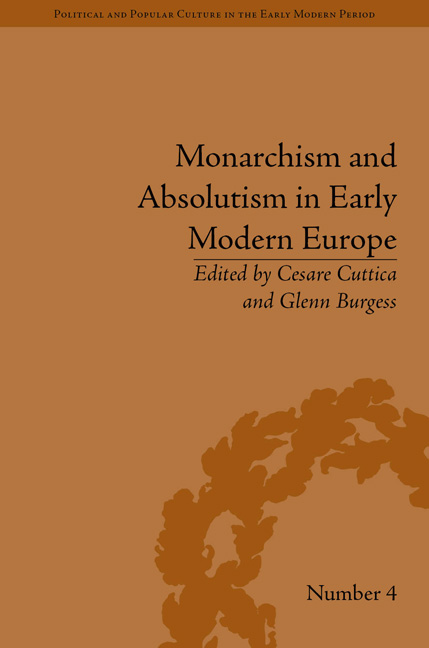Book contents
- Frontmatter
- CONTENTS
- Acknowledgements
- List of Contributors
- Introduction: Monarchism and Absolutism in Early Modern Europe
- Part I Royalists, Republicans, Patriarchalists: English Thinkers at Odds in the Seventeenth Century
- Part II Absolutism, Cynicism, Patriotism: Eighteenth-Century Enlightenment Reflections
- Part III Absolutism, Monarchism, Despotism in Theory and Practice: Contested Historiography and Comparative Approach
- Part IV Monarchy, the State of Nature, Religion and Iconography in European Perspective
- 11 ‘Monstrous’ Pufendorf: Sovereignty and System in the Dissertations
- 12 Absolute Chaos, Absolute Order: The Rhetoric of the State of Nature in the Discourse of Sovereignty
- 13 Bayle on Brutus: A Paradoxical Issue?
- 14 ‘More Long-Lasting Than Bronze?’ Statues, Public Commemoration and Representations of Monarchy in Diderot's Political Thought
- Notes
- Works Cited
- Index
12 - Absolute Chaos, Absolute Order: The Rhetoric of the State of Nature in the Discourse of Sovereignty
from Part IV - Monarchy, the State of Nature, Religion and Iconography in European Perspective
- Frontmatter
- CONTENTS
- Acknowledgements
- List of Contributors
- Introduction: Monarchism and Absolutism in Early Modern Europe
- Part I Royalists, Republicans, Patriarchalists: English Thinkers at Odds in the Seventeenth Century
- Part II Absolutism, Cynicism, Patriotism: Eighteenth-Century Enlightenment Reflections
- Part III Absolutism, Monarchism, Despotism in Theory and Practice: Contested Historiography and Comparative Approach
- Part IV Monarchy, the State of Nature, Religion and Iconography in European Perspective
- 11 ‘Monstrous’ Pufendorf: Sovereignty and System in the Dissertations
- 12 Absolute Chaos, Absolute Order: The Rhetoric of the State of Nature in the Discourse of Sovereignty
- 13 Bayle on Brutus: A Paradoxical Issue?
- 14 ‘More Long-Lasting Than Bronze?’ Statues, Public Commemoration and Representations of Monarchy in Diderot's Political Thought
- Notes
- Works Cited
- Index
Summary
When Thomas Hobbes advanced his elaborate and, in many ways, novel theory of absolute sovereignty, he claimed that it was equally applicable to monarchy, aristocracy and democracy, ‘for either One, or More, or All, must have the Soveraign Power (which I have shewn to be indivisible) entire’. Hobbes's own preference for monarchy, coupled with the imagery of Leviathan, convinced many of his readers that his theory was the groundwork for an absolute monarchy of the kind that ruled France. Thus, in 1651, the republican William Rand noted,
For that Empire the Whale holds in the Sea is a fit resemblance of the Monarchy [Hobbes] would establish, submitting all to the will of a man who many times measures right by this power, & by potency of Lusts, has little more reason then a Whale, & under whose government the Law of Liviathan is established vz: That it be right & fit that the great fishes eat up the little, as it is in France at this day & elsewhere.
Many readers concurred with this assessment, but some looked more closely at the awesome image of the sovereign which adorns the frontispiece of Leviathan, and noticed that his body is composed of his subjects. This detail encapsulates Hobbes's attempt to justify absolute sovereignty by means of a radical contrast between civil society and the state of nature, a condition of radical uncertainty, in which individuals are the bearers of rights and the ultimate authors of sovereignty.
- Type
- Chapter
- Information
- Monarchism and Absolutism in Early Modern Europe , pp. 177 - 186Publisher: Pickering & ChattoFirst published in: 2014



